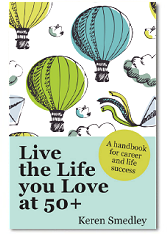Keren Smedley 15th November 2016
Do you want to know how to Live longer, younger and happier?
Sign in to Experience Matters to receive our top 20 tips, newsletter, and video updates!
Learning to cope
 I’ve recently moved house and I’m sure that any of you who’ve moved are aware what an upheaval it can be.
I’ve recently moved house and I’m sure that any of you who’ve moved are aware what an upheaval it can be.
I’ve moved quite a lot over the last few years so I know in theory what is it you’re meant to do. I make lists, contact all the relevant people and do a very basic spread sheet with activities. What always surprises me is the unexpected that I couldn’t have predicted and of course the emotional effect it has.
It isn’t just moving where we are faced with the unexpected; learning to cope is a very useful strategy.
If you’re a planner you will try, as I did, to cover all eventualities but of course life isn’t like that so we need to be able to be flexible and change our plans without feeling thrown and unable to act.
If you’re not a planner and you just go with the flow you too will be subject to uncertainty and changes that you may not feel well equipped to manage. Learning a strategy to keep your emotional equilibrium is useful for us all. When we find ourselves feeling thrown by events we literally stop being able to think clearly. At that moment we often make poor decisions.
The exercise below is a useful exercise to help you to create a technique you can employ when life just doesn’t go the way you want it to.
Part A. Think of a situation where everything went as planned and you felt totally in control. Then answer the following questions:
- What is the situation?
- What do you say to yourself? (Inner self-talk)
- How do you feel? (Feelings and sensations in the body)
- What do you do? (As a consequence)
Part B. Think of a situation where everything didn’t go as planned or you think it might not go as planned, and answer the following questions:
- What is the situation?
- What do you say to yourself? (Inner self-talk)
- How do you feel? (Feelings and sensations in the body)
- What do you do? (As a consequence)
Go back to the situation in Part B and using information that you have about yourself from the situation in Part A ask yourself the following questions:
- What could I say to myself? (A positive statement about self)
- How could I feel differently? (For example, if you want to feel more relaxed you could breathe more deeply)
- What could I do, and what will I do differently? (Direct action that I could and will take)
Learning to manage uncertainty is an essential skill in today’s fast paced world.
We’d be interested to hear from you on how you manage and where there are difficulties.
We at Experience Matters are here to help you when you’re finding it difficult to manage a situation please make contact with us.
If this blog has raised some issues for you, you may want to talk to one of our life coaches.
Like our page….. https://www.facebook.com/experiencematters.coaching/
PS please share this if you think that it might help someone else.
Share this ..


